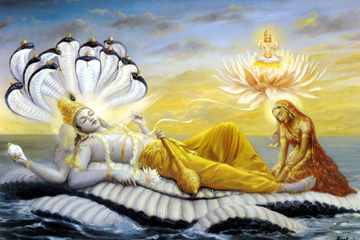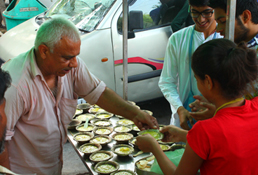The untold glories of Kamada Ekadasi are described in the Varaha Purana in a delightful conversation between Maharaj Yudhistira and Sri Krsna.The king asked: “My dear Lord, crowning jewel of the yadu dynasty. Please enlighten me about the nature of this most auspicious day. Kamada Ekadasi. Please accept my humble obeisances and advise me how one should observe this Ekadasi that falls during the month of Chaitra while the moon is waxing. Please also describe what the benefits of such observance are and advise me how to reap the result.”
“Sri Krsna replied: “My dear maharaja Yudhisthira, please hear attentively the description of this Ekadasi day which has been recorded in the ancient Purana. One time Maharaja Dilip, the great grandfather of Sri Ramacandra, asked his dearly beloved and most magnanimous spiritual master Vasistha, about the name and procedure for observing this Ekadasi, ‘Kamada’ which occurs during the month of Chaitra (March/April.)
“The saintly & sagacious Vasistha replied, ‘O my dear King, naturally i will fulfill your desire to hear the glories of this Ekadasi day. The name of this inscrutably alligned, constellatory opportunity is Kamada. The essence of such a day is the realisation of the delineation of lust and love; and knowing the difference between the two. This sacred Ekadasi burns all one’s sinful reactions to ashes and awards the observer the privelege of having an intelligent and confident son. Now, please hear the glories of this Ekadasi.”
“Once, in the city of Ratnapura (Bhogipura) there was a great and venerable king known by the name of Pundarika. He was accompanied by his joyful and kindly munificent subjects which included the Gandharvas, Kinnaras and the Apsaras. In that sweetly opulent city there lived a fantastically beautiful Apsara named Lalita and a handsome, regal Gandharva known as Lalit. They lived happily as husband and wife and were consistently overwhelmed by each other’s love; to the point of madhness. They were constantly engaged in sporting activities and relished each others company until their association burned at the heartstrings and knarled their brains to the point of exhaustion.”
“One time in the court of King Pundarika many Gandharva’s were engaged in blissful frivolities, they were singing and dancing and covorting in great bliss. Lalit sang with the Gandharvas although his wife did not, rather she danced in great ecstacy with the many joyous Apsaras. Due to the pangs of separation that Lalit was experiencing in separation from his devoted wife, he felt intense hankering and dove into an ocean of tears. His innunciation during his singing grew weaker and he forgot the words to many songs that he knew off by heart.”
“Oh king, in that assembly there was one serpent from the Patala Region, he went by the name of Karkotaka and knew well the mystery of this situation. He complained in a greatly thunderous voice, “O lalit you have spoiled the perfomance here by your attachment to your wife, you have upset the taal (rhythm) of the piece and distracted the singers. Therefore i curse you to be a man-eater cannibal.’
“Being thus cursed by such a serpentine character, Lalit immediately transformed into a great demon and all could see there was fearsome fire in his eyes. When lalita saw her husband’s terrifying form she was extremely hurt and distressed. In intense pain and distress she spent her days and nights simply thinking of where to go, what to do and who to see. However, her fears allayed she felt no understanding of where she was, what she was doing and who she was seeing. She was simply lost on an ocean of delinquent separation. Surrendering all embarrassment she lived with her husband in the forest.”
“Once, while wandering within the dense forest with her husband, Lalita saw the most sacred ashrama of the sage and Sringi situated at the peak of the Vindhiya Mountain. Lalita immediately went there and offered her respectful obeisances to the sage. Upon seeing this lady, the sage inquired, ‘O beautiful one, who are you and where do you come from? Why have you come here and what duty will you perform here?’
“Lalita replied: “O great soul, I am the daughter of the great and kind hearted Gandharva named Viradhanva. My name is Lalita and I live in this forest with my husband. He has been cursed by a ferocious serpent and is now in the form of a demon. O brahmana! I am greatly indebted to you for your kind darshan and have no means of rescuing my husband myself. Please, as a great brahmana you must surely have the ability to help. If there is at all some way of atonement that will remove this horrendous afflication, then please; tell me!”
“After hearing Lalita’s pathetic request, the sage Sringi said, ‘O daughter of the Gandharva, in a few days time during the waxing Moon of the Chaitra month. There is a munificent Ekadasi day, known as Kamada. By observance of this day all one’s sinful reactions can be completely annhiliated. By following this (vow) and giving the entire merit to your husband, all one’s desire’s will be fulfilled. Then, by the influence of this merit your husband will immediately become freed from the curse.”
“O King! Being instructed in this way by the sage, Lalita gladly observed the vow of this Ekadasi. On the day of Dvadasi, Lalita gladly sat in front of the brahmanas and the Supreme Lord Vasudeva and announced: “I have observed the Ekadasi vrata as you reccomended, I have abstained from food and water for the duration and am now gladly offering my results unto my dearest husband. I pray that my piety will remove his demoniac condition and alleviate our suffering.”
“As soon as Lalita had finished her prayer, her husband-turned-demon, ‘Lalit’ became freed from the reactions of his sins and regained his divine Gandharva form. From that time on Lalit and Lalita lived happily together.”
“Lord Krsna concluded, “O Maharaja Yudhisthira! O best of kings! Anyone who hears the narration of this most charmingly blissful day should certainly observe it to the best of his ability. There is no better vow as it can eradicate even the sin of killing a brahmana and easily counteracts demoniac curses.”







